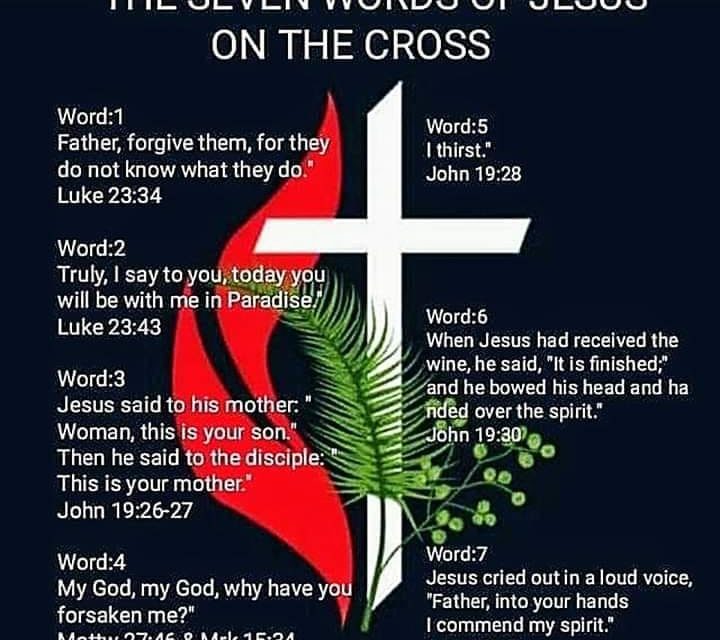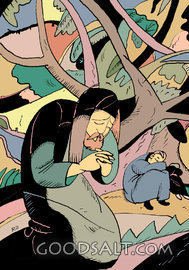Following the betrayal, arrest, desertion, false trial, denial, condemnation, beatings, and mockery of Jesus, Pilate bowed to the pressure of the temple leadership and the crowds, and Jesus was nailed to the cross. Today we acknowledge the power of the cross in our lives with a consideration how the apostles might have gathered that night 2000 years ago together in fear and prayer reflecting on all that happened.
This year’s Good Friday has come in the middle of the global coronavirus (covid-19) pandemic. From the global helplessness and lock-down, how do we reflect on the deadly effects of the pandemic in the light of Jesus Christ’s passion? We are parts of the Good Friday story at different times and stages of our lives – weeping like Mary, denying Jesus like Peter, betraying Jesus like Judas, taking comfort and glory in our nation and position rather than God like the crowds and chief priests. The truth is that the experience, the grief and despair of the Good Friday story could be difficult to handle for the 12 disciples hence, two unknown disciples – Joseph of Arimathea and Nicodemus were at the foot of the cross after Jesus dies.
It is observed that ‘where Judas betrayed Jesus, Joseph of Arimathea claims Jesus’ body. Where Peter denied Jesus, Nicodemus gathers burial spices and heads to the tomb.’ The tragedy of the first Good Friday became a triumphant Resurrection rather than any mode of a funeral liturgy because of the roles played by Joseph of Arimathea and Nicodemus. The compassion and action taken by Joseph and Nicodemus both men of power, privilege and wealth signals a change in their own discipleship as they clearly break with the rest of the Jewish leadership. God has never left Himself without a witness (Acts 14:17).
As members of the Sanhedrin, it is possible that Joseph and Nicodemus had dissented from the vote to kill Jesus and now looking unto him and mourning. The reflection is that nobody is beyond God’s mercy and salvation including the Josephs and Nicodemus under the attack of the pandemic. As we think of the pandemic victims and their families, we together in prayer lift them up and especially for God’s mercy over the world. Luke tells the story of Good Friday from the viewpoint of the participants and their different responses to the cross. While some responded in sorrow, some in ignorance, some in shameless indifference like the soldiers. The soldiers could only take a few pieces of clothing from the cross, no changed hearts, no changed visions, no changed lives and no knowledge of a Saviour.
At Golgotha, a dying thief despite open mockery of the crowds confessed Jesus, a dying king, as his Saviour. The response of the dying thief to the cross gave direction to his eternal life. According to Evelyn Underhill, ‘what we think about the cross means ultimately what we think about life.’ We are called to journey with Jesus to the cross. At the cross, the powerful words of Christ comes alive to us as forgiven people with a word of hope in the darkest hour and place of the cross. In Jesus’ family, everybody is a relative hence he said, ‘woman, behold your son: son behold your mother.’ The cross calls us to listen to sound of peoples suffering and respond to those who are thirsty. The words of Jesus ‘it is finished,’ is a positive cry of triumph, it is accomplished and mission fulfilled, task completed for our salvation and forgiveness. Jesus did not say ‘I am finished,’ what is finished is the price paid for our salvation and reunion with the Father (Jn 3:14-7; 17:4).
The finished work of Christ is our new beginning, source of our motivation. Charles Wesley in one of his great hymns based on the narratives of Jesus’ crucifixion illustrates a good reflection on Good Friday beyond a funeral liturgy: ’O Love divine, what hast thou done! The immortal God hath died for me! The Father’s co-eternal Son, Bore all my sins upon the tree; The immortal God for me hath died! My Lord, my love is crucified…. Is crucified for me and you, To bring us rebels back to God; Believe, believe the record true, We are bought with Jesu’s blood, Pardon for all flows from his side; My Lord, my Love is crucified. Then let us stand beneath the cross, And feel his love a healing stream, All things for him account but loss, And give up all our hearts to him; Of nothing think or speak beside: My Lord, my Love is crucified.’











Recent Comments